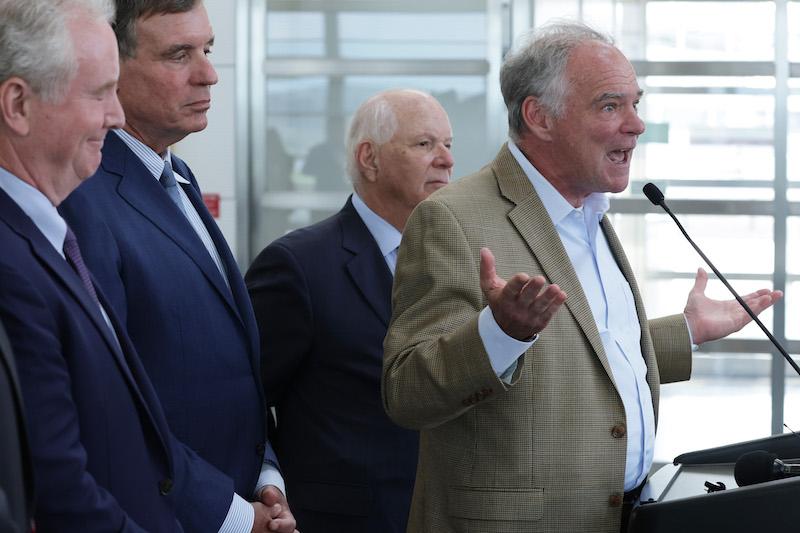DCA Slot Issue Still Sticking Point As House, Senate Negotiate FAA Reauthorization

Sen. Tim Kaine speaks as (from left) Sens. Chris Van Hollen (D-Md.), Mark Warner (D-Va.) and Ben Cardin (D-Md.) listen during a news conference at Reagan Washington National Airport.
U.S. senators representing the states of Maryland and Virginia are making another push against adding more long-distance flights from Reagan Washington National Airport (DCA), arguing such routes would “negatively impact service” and increase flight delays.
“As the House and Senate work toward a final FAA reauthorization bill, we urge you to reject any proposal to add additional flights at an overburdened DCA,” wrote Sens. Ben Cardin (D-Md.), Chris Van Hollen (D-Md.), Tim Kaine (D-Va.) and Mark Warner (D-Va.) in a March 15 letter to colleagues. The Metropolitan Washington Airports Authority, which manages DCA and Washington Dulles International Airport (IAD), is also opposed to new beyond-perimeter flights.
An FAA reauthorization bill cleared in February by the Senate Commerce, Science and Transportation Committee includes a provision adding five beyond-perimeter slot pairs at DCA, creating conflict with the House of Representatives, which rejected additional DCA slots after a contentious debate before that chamber passed its version of FAA reauthorization legislation in July 2023.
Currently, 40 daily departures from DCA (out of more than 800) are to destinations beyond the 1,250-mi. perimeter governing most of the airport’s flights. Any additions have to be legislated by Congress.
The full Senate is now considering the bill cleared by committee with FAA’s authorization temporarily extended in early March to May 10. Key House and Senate members are in negotiations over a final, five-year bill that could pass both chambers by that date. The Senate could pass a bill that enough House members back so the House could then pass an identical bill without further legislative wrangling, allowing the legislation to be signed into law by President Joe Biden.
“Additional beyond-the-perimeter flying at an already at-capacity DCA would adversely impact service at [multiple] airports with increased delays and cancellations, downgrading the operational performance of these routes and hurting the passenger experience, with no benefit to … communities that rely on regular, reliable service to and from DCA,” the senators wrote.
The senators also framed the issue in terms of safety, pointing to “high-profile incidents and near-misses” in recent months at other U.S. airports. “Adding 10 additional flights into an already overburdened airport is directly contrary” to what is best for safety, they wrote.
The group combined represent most of the catchment area for DCA, which is located in Arlington, Virginia, across the Potomac River from Washington.
The senators note the House “strongly defeated” by a wide majority a proposal to add 14 beyond-perimeter slots at DCA. The senators say that “20%-22% of flights into and out of the airport experience delays averaging 67 min. And landside congestion is, if anything, worse.”
They note that DCA is expected to handle 25 million passengers this year, which they argue is 10 million above the capacity for which the airport was designed.
The DCA spat is seen as among the most contentious issues that must be resolved between the House and Senate before a final FAA reauthorization bill can be passed.
The Capital Access Alliance (CAA), a group of businesses including Delta Air Lines that have joined to advocate for additional beyond-perimeter slots, say "DCA is the only airport in the country that is subject to an outdated, federally imposed perimeter rule.”
CAA adds: “Air traffic has increased 10-fold within the last 60 years. The current perimeter rule isn’t fit for today’s air travel ecosystem in Washington, DC. Improving access to and from our nation’s capital will make air travel more affordable and efficient, create thousands of jobs and generate millions of dollars in tax revenue.”





